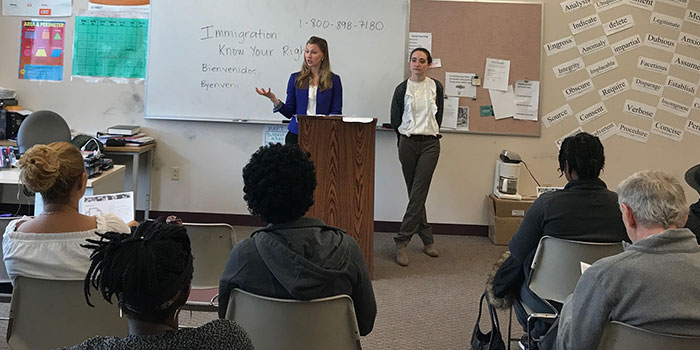Responding to Uncertainty
Hilary Chadwick (’17) discusses how BU Law clinics are helping immigrant communities understand their constitutional rights.
 Recent changes in immigration law have illuminated privileges that were once invisible to me. I can walk to class without worrying that an immigration official might stop me along the way. Showing up at work will never increase my risk of deportation. Presenting my ID at a bar, which reveals my country of origin, does not trigger suspicion. However, many of our noncitizen neighbors cannot claim these same privileges.
Recent changes in immigration law have illuminated privileges that were once invisible to me. I can walk to class without worrying that an immigration official might stop me along the way. Showing up at work will never increase my risk of deportation. Presenting my ID at a bar, which reveals my country of origin, does not trigger suspicion. However, many of our noncitizen neighbors cannot claim these same privileges.
A clinician at a community health center provided insight into how President Trump’s executive orders on immigration have affected the Roxbury community. “Patients have not come into the clinic to complete their insurance applications and/or re-certifications due to fear that this could be used to track their whereabouts. [Others are] fearful that they will get stopped and questioned by immigration on their way to visits. It is very concerning that patients are having to choose between their health and their sense of safety due to the fear and paranoia these recent immigration orders and policies have caused them.” In response to this uncertainty, the PAIR Project has trained lawyers and law students to provide immigration Know Your Rights (KYR) presentations in the greater Boston area.
During the last week of class, I went to Roxbury and Dorchester with four fellow students, Clinical Associate Professor Karen Pita Loor, and Clinical Instructor Sarah Sherman-Stokes to give KYR presentations at adult education and community health centers. Interacting with these community members reminded me of the impact of the president’s policies. “Audience members were in tears, recounting their own interactions with immigration agents, their fear of deportation and, their fear of even showing up at our presentation—afraid that we were working for the government or that they might be at risk just for learning their constitutional rights,” said Sherman-Stokes.
The goals of our KYR presentations were basic. We sought to clarify the president’s executive orders on immigration, teach audience members about their constitutional rights, and demonstrate how they could respond if confronted by an immigration official. Yet, the impact of this knowledge was immediate. When my co-presenter, Vidhi Bamzai (’18), held up a card explaining to a law enforcement official that the individual presenting the card was exercising her constitutional right to remain silent, an audible “Ooo” arose from the crowd. This tangible tool symbolized strength and protection. In the face of uncertainty about how new immigration policies will be enforced and who will be targeted for removal, having an action plan is empowering. It takes back some of the control that has been stripped from immigrants since the president took office.
As law students and future lawyers, we are uniquely positioned to serve as a resource in our communities. Our 1L classes, such as Constitutional Law and Criminal Law, provide a framework of one’s basic rights and (as uncomfortable as the Socratic method is) develop our ability to speak effectively in public. The clinical programs available during 2L and 3L train us to advocate on behalf of clients and communicate complex legal jargon in a straightforward way. The combination of these academic and practical skills enables us to provide insight into how changes in the law affect the daily lives of our community members.
While taking on a commitment during a busy time of year may seem unmanageable, the rewards are unmatched. Mario Paredes (’18), another co-presenter, captures this sentiment: “Having the opportunity to step outside of the law school and interact with immigrant community members in the Boston area was worth every second of my time. Communities are anxious right now, and as law students, we have an ethical obligation to stand in solidarity with them, listen to them, and share our knowledge with them.”
With the support of our professors, BU Law students have an opportunity to make an immediate impact in our Boston community that requires a minimal time commitment. The Immigrants’ Rights and Human Trafficking Program, in collaboration with the Criminal Law Clinical Program, hope to continue these KYR presentations in the new school year. Sarah Sherman-Stokes reiterates this urgent need: “I hope that we can continue to involve BU Law students in using their legal skills for good—out in the community, at a time when we need good lawyers to show up and make a difference.”